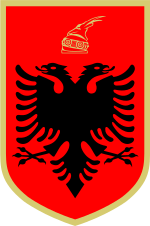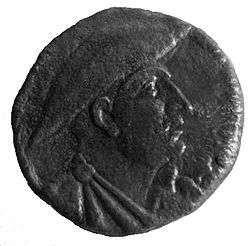Taulantii
Taulantii or Taulantians[1] (Ancient Greek: Ταυλάντιοι, Taulantioi or Χελιδόνες, Khelidones, "swallow-men") were an Illyrian people that lived on the Adriatic coast of southern Illyria (modern Albania). They dominated at various times much of the plain between the Drin and the Aous. The centre of Taulantian kingdom is likely to have been in the area of Tirana, in the hinterland of Dyrrah/Epidamnus.[2] The Taulantii are among the oldest attested Illyrian peoples, who established a powerful kingdom in southern Illyria.
Name
An Illyrian people named Taulantii was firstly recorded in written sources by ancient Greek writer Hecataeus of Miletus in the 6th century BC. The Taulantii are often mentioned in the works of ancient writers describing the numerous wars they waged against the Macedonians, the Epirotes, and the ancient Greek colonies on the Illyrian coast.[3]
The term taulantii is connected with the Albanian word dallëndyshe, or tallandushe, meaning "swallow".[4] The name Chelidones also reported by Hecateus is the translation of the name Taulantii as khelīdṓn (χελιδών) means "swallow" in Ancient Greek.[5][6]
History
The Taulantii are one of the most anciently known Illyrian group of tribes.[7] They lived on the Adriatic coast of southern Illyria (modern Albania), dominating at various times much of the plain between the Drin and the Aous.[8] In earlier times the Taulantii inhabited the northern part of the Drin river;[9] later they lived in the sites of Dyrrah and Apollonia.[6][9]
Taulantian arrival at the site of Dyrrah is estimated to have happened not later than the 10th century BC. After their occupation of the site, Illyrian tribes most likely left the eastern coast of the Adriatic for Italy departing from the region of Dyrrah for the best crossing to Bari, in Apulia.[10][11] When they settled in the area of Dyrrah, it seems that the Taulantii replaced the previous inhabitants, the Bryges. About the 9th century BC the Liburni expanded their dominion southwards, and took possession of the site expelling the Taulantii.[10][12] After 800 BC they expanded southwards and controlled the plain of Malakaster reaching as far as the mouth of the Aous.[13] In the 7th century BC the Taulantii invoked the aid of Corcyra and Corinth in a war against the Liburni.[14][12] After the defeat and expulsion from the region of the Liburni, the Corcyreans founded in 627 BC on the Illyrian mainland a colony on the headland Dyrrah, mixing with the local population and establishing the Greek element to the port. The city was called Epidamnus, thought to have been the name of a barbarian king of the region.[11][14] A flourishing commercial centre emergend and the city grew rapidly.[15][14] Business relations with the Illyrians of the hinterland were conducted by the poletes (a magistrate).[14] The Taulantii continued to play an important role in Illyrian history between the 5th and 4th–3rd centuries BC. They significantly influenced the affairs of the city, especially in the internal conflicts between aristocrats and democrats. When the democrats seized power, their opponents (allies of the Corcyreans) sought help from the Illyrians. In 435 the Illyrians besieged the city in strength, and through the occupation of the surrounding region, they caused much damage to the economy of the city.[15]
When describing the Illyrian invasion of Macedonia ruled by Argaeus I, somewhere between 678–640 BC, the historian Polyaenus (fl. 2nd-century CE) recorded the oldest known king in Illyria, Galaurus or Galabrus, a ruler of the Taulantii who reigned in the latter part of the 7th century BC.[16][17] However nothing guarantees the authenticity of Polyaenus' passage.[17] In the well attested historical period, the Taulantian kingdom seems to have reached its acme during Glaucias' rule, in the years between 335 BC and 302 BC.[18][19][20] After Glaucias' rule, the Taulantian territory likely were absorbed partly by Pyrrhus in the Epirotan state and partly by other Illyrian realms established in southern Illyria.
In Greek mythology
According to Greek mythology Taulas (Tαύλας), one of the six sons of Illyrius, was the eponymous ancestor of the Taulantii.[21]
Culture
The Abri, a northern subgroup of the Taulantii, were known to the ancient Greek writers for their technique of preparing mead from honey.[6]
Illyrian dynasty
The following names are recorded in ancient sources as Taulantian chieftains and/or Illyrian kings:[22][16][23]
- Galaurus or Galabrus (latter part of the 7th century BC), the oldest known Illyrian king, recorded by Polyaenus (fl. 2nd-century CE), but nothing guarantees the authenticity of Polyaenus' passage
- Pleuratus I (fl. c. 345 – 344 BC)
- Glaucias (ca. 335 – 302 BC)
Sources
Citations
- James R. Ashley, The Macedonian Empire, McFarland, 2004, p. 172.
- Hammond 1966, p. 247.
- Stipčević 1989, p. 35.
- Wilkes 1992, p. 244: "Names of individuals peoples may have been formed in a similar fashion, Taulantii from ‘swallow’ (cf. the Albanian tallandushe) or Erchelei the ‘eel-men’ and Chelidoni the ‘snail-men’ [sic]."
- Šašel Kos 1993, p. 119.
- Wilkes 1992, p. 98.
- Katičić 1976, p. 158.
- Wilkes 1992, pp. 97–98.
- Stipčević 1974, p. 31.
- Hammond 1982, p. 628.
- Wilkes 1992, pp. 110–111.
- Wilkes 1992, p. 111.
- Hammond, N. G. L. (1997). "Prehistory and Protohistory". Epirus: 4000 Years of Greek Cilization and Culture. Ekdotike Athenon: 42.
This enterprising and martial people expanded again after 800 B.C.... the Taulantioi seized the Malakastra plain and reached the mouth of the Aoous
- Hammond 1982, p. 267.
- Wilkes 1992, p. 112.
- Hammond & Griffith 1972, p. 21.
- Cabanes 2002, p. 51.
- Hammond 1966, p. 253.
- Dzino 2014, p. 49.
- Wilkes 1992, pp. 112, 122–126.
- Boardman & Sollberger 1970, p. 629.
- Cabanes 2002, p. 90.
- Wilkes 1992, p. 336.
Bibliography
- Boardman, John; Sollberger, E. (1970). The Cambridge Ancient History. 3. Cambridge University Press. p. 629. ISBN 978-0-521-22496-3.CS1 maint: ref=harv (link)
- Cabanes, Pierre (2002) [1988]. Dinko Čutura; Bruna Kuntić-Makvić (eds.). Iliri od Bardileja do Gencia (IV. – II. stoljeće prije Krista) [The Illyrians from Bardylis to Gentius (4th – 2nd century BC)] (in Croatian). Translated by Vesna Lisičić. Svitava. ISBN 953-98832-0-2.
- Dzino, Danijel (2014). "'Illyrians' in ancient ethnographic discourse". Dialogues d'histoire ancienne. 40 (2): 45–65.CS1 maint: ref=harv (link)
- Hammond, Nicholas Geoffrey Lemprière (1966). "The Kingdoms in Illyria circa 400-167 B.C.". The Annual of the British School at Athens. British School at Athens. 61: 239–253. JSTOR 30103175.CS1 maint: ref=harv (link)
- Hammond, Nicholas Geoffrey Lemprière; Griffith, Guy Thompson (1972). A history of Macedonia. 2. Clarendon Press.CS1 maint: ref=harv (link)
- Hammond, N. G. L. (1982). "Illyris, Epirus and Macedonia". In John Boardman; N. G. L. Hammond (eds.). The Cambridge Ancient History: The Expansion of the Greek World, Eighth to Sixth Centuries B.C. III (part 3) (2 ed.). Cambridge University Press. ISBN 0521234476.CS1 maint: ref=harv (link)
- Hammond, N. G. L. (1994). "Illyrians and North-west Greeks". The Cambridge Ancient History Volume 6: The Fourth Century BC. Cambridge University Press.CS1 maint: ref=harv (link)
- Katičić, Radoslav (1976). Ancient Languages of the Balkans. Mouton. p. 158.CS1 maint: ref=harv (link)
- Šašel Kos, Marjeta (1993). "Cadmus and Harmonia in Illyria". Arheološki Vestnik. 44: 113–136.CS1 maint: ref=harv (link)
- Stipčević, Aleksandar (1974). The Illyrians: history and culture (1977 ed.). Noyes Press. ISBN 978-0815550525.CS1 maint: ref=harv (link)
- Stipčević, Aleksandar (1989). Iliri: povijest, život, kultura [The Illyrians: history and culture] (in Croatian). Školska knjiga. ISBN 9788603991062.CS1 maint: ref=harv (link)
- Wilkes, John J. (1992). The Illyrians. Oxford, United Kingdom: Blackwell Publishing. ISBN 0-631-19807-5.CS1 maint: ref=harv (link)

